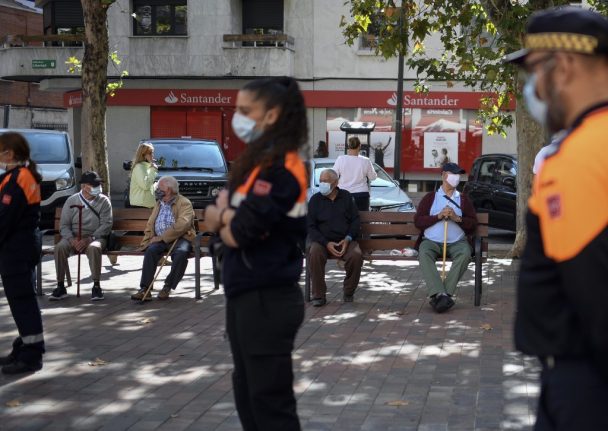The curbs, which will be in place for two weeks, affect 850,000 people in mainly densely-populated, low-income neighbourhoods.
Residents are now only allowed to leave their zone for going to work, school or to seek medical care.
READ ALSO Rules, permits, fines: What you need to know if you live within Madrid's new confinement zones
Public parks are closed in the districts and cafes and restaurants must shut by 10 pm.
“It makes no sense because what difference will it make? The virus is in the air, it will be there,” said 65-year-old pensioner Maritere Vazquez.
The regional government says the affected areas have all counted more than Covid-19 cases per 100,000 inhabitants — around five times the national average, which in itself is the highest in the European Union.
“If it's the case that right here there are more outbreaks, something had to be done, measures had to be taken,” Gustavo Ojeda, 56, told AFP at the exit of a metro station in Puente de Vallecas, a working class neighbourhood in southern Madrid as he returned home after working overnight at a warehouse on the outskirts of the Spanish capital.
Police checks
In Puente de Vallecas, which was born out of a slum and was heavily bombed during Spain's 1936-39 civil war, there are 1,241 cases per 100,000 inhabitants.
“Facts are facts, there is a source of infection on this side of Madrid,” said Ojeda, wearing a face mask.
He said when he went to work in recent days he would see people inside a bar without masks or “walking with their mask on their elbow, on their forehead.”
The metro station is on a main avenue that marks the border between Puente de Vallecas and another area which has escaped the restrictions.
Police were not checking pedestrians but several patrol cars stopped vehicles at random to see if the passengers had proof that they had an acceptable reason to travel.
A policeman said officers were only reminding drivers of the new curbs but would start fining rulebreakers from Wednesday.
Andres Vieco, a 37-year-old jobless man, was stopped by the officer while on his way home after babysitting for a friend and was told he would not be allowed through in the future.
“We will see how we can work around it,” Vieco said.
Some 200 municipal police will be deployed at around 60 such checkpoints across Madrid to enforce the virus restrictions.
'People have to move'

In the adjoining side streets several people questioned why the restrictions were not put in place in the entire Madrid region, which is home to 6.6 million people and is the epicentre of the virus outbreak in Spain.
Alejandro Campos, a 30-year-old travel agent who has been working from home since March, said it will be hard to stop people from travelling between the different areas.
“You can't close one part of a neighbourhood and not another one, one street yes, and one street no. So, either you close everything, which will be catastrophic, or you close nothing,” he said as he took his two dogs for a
walk.
Many people in southern Madrid neighbourhoods such as Puente de Vallecas work in service sector jobs and can't telecommute.
“Unfortunately the people who are going to work in restaurants and bars are from here, people will have to move all the time, many people here are hospitality workers,” he said.
Words by AFP's Diego Urdaneta. Pictures by Oscar de Pozo. Video by Benjamin Bouly Rames
READ ALSO:



 Please whitelist us to continue reading.
Please whitelist us to continue reading.
Member comments